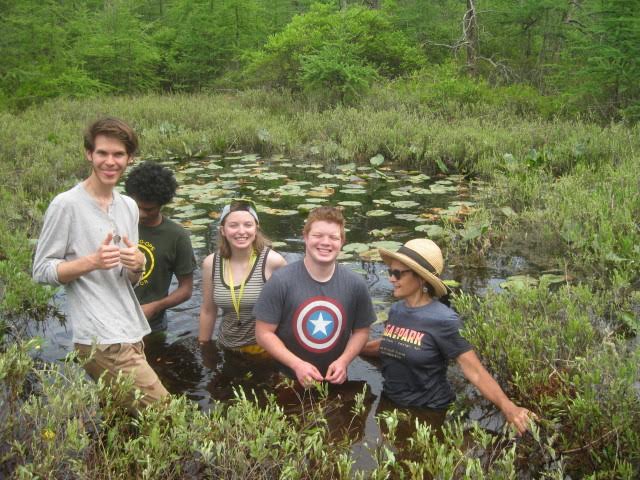Plant Diversity (BIO 255)

Plant Diversity (BIO 255) students visit Frog Bog in Livingston County where they encounter several Sphagnum species, pitcher plants, sundews, lady slippers, and the occasional frog.
Left to right: Dominic Vetuschi, Julian Tabron, Shelby Polisuk, Nathan Fischer, RJB
Integrate your field techniques and the laboratory study of local flora biodiversity by taking BIO 255! In this course, you will learn to key plants and species using a hand lens or microscope, and sight-i.d. over 30 families of angiosperms, conifers, and ferns. You will also have the chance to observe and record phenology (change over time) of traits in one local species and create a species account for one native Michigan species. If you are interested in observing and learning about plants uses and habitats in Michigan, this is the right course for you! Please note: this class will go to a different location every Wednesday to observe and identify flora.
Neotropical Plant Families (EEB 463)

On a 5-day field trip to Missouri Botanical Garden, Neotropical Plants (EEB 463) explored conservatories and their extensive dried plant collections. Each participant completed a herbarium-related project using dried plant specimens.
L to R: Kate Chapel (GSI), Nikki Diroff, Megan Skrzypek, Amanda Salvi, Lauren Achtememier, Peter Stevens
Are you interested in learning more about plants and idenification processes? If you sign up for EEB 463! In EEB 463, you will familiarize yourself with over 25 neotropical plant families at the level of major genera for field identification and ecological study. By the end of this course, you will be able to identify sterile material to emphasize characters not normally found in taxonomic keys, but are required in ecological surveys. You will also become familiar with the most practical field guide to neotropical plant families and genera (Gentry). Please plan to practice regularly with the specimens in the lab – no amount of theory impresses your instructors like a genuine feel for the plants!
For more information about Ecology and Evolutionary Biology courses taught by U-M faculty, visit the EEB Homepage.



